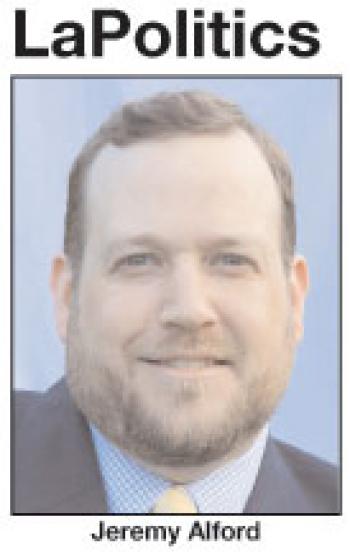
Fees are sure to come up in special deficit session
Options.
That’s the buzzword coming from the fourth floor of the State Capitol these days, which is where Gov. John Bel Edwards and his staff work.
While there was some thought about a cuts-only special session next month, the Edwards Administration is heeding calls from lawmakers for revenue-raising options and part of that strategy will include fees.
The governor is expected to call a 10-day special session beginning on Feb. 13 and he alone will be able to set the agenda.
That’s important in terms of what kind of bills lawmakers can file. If the subject matter is not on Edwards’ agenda, the legislation cannot be introduced.
While fees represent a quick way the state can get cash during the final months of the fiscal year that ends on June 30, Edwards is taking a very nuanced approach to their potential role in the special session.
He plans to include fee increases and the creation of new fees on his agenda, but the governor will not personally make any such proposals.
Individuals and businesses pay fees for permits. Farmers and commercial fishermen pay fees that get channeled back into their industries. Practically every department and agency in the state relies on fees for operations.
From a political perspective, fees may serve as an easier pill for conservative lawmakers to swallow, as opposed to taxes, which the governor has indicated are unlikely to be featured prominently in his special session agenda.
Just how far lawmakers can go with fees while facing a $304 million deficit remains to be seen.
The Department of Health and the Department of Environmental Quality both pushed for massive fee packages in the 2016 regular session. There were also proposed new fees or fee increases for state courts, the Office of Motor Vehicles, cemeteries, fishing guides, drones, pipeline operators, clemency investigators, architects and more than a dozen other categories.
The governor, however, appears to be more interested in spending reductions and a key fund transfer. In particular, Edwards has proposed using $119 million from the state’s special savings account, known as the Rainy Day Fund, to help erase part of the deficit.
Business expecting
contingency fee bill
In this week’s episode of The LaPolitics Report podcast, Louisiana Association of Business and Industry President Stephen Waguespack hinted at a possible legislative legal battle for the regular session that convenes in April.
Waguespack said his organization believes a bill could be introduced to ease some of the limitations on contingency fee legal contracts.
The debates over contingency fee agreements inked by the state have caught fire in recent years, pulling in governors, attorneys general, lawmakers, private attorneys and lobbyists.
The arrangement, in broad strokes, usually involves a private law firm representing the state or a political body in exchange for part of a settlement presumably to be awarded later.
State law prohibits any such payout unless it is authorized by the Legislature.
“We hear that there is a strong likelihood that there will be legislation filed, either overtly or covertly, to make it much easier to hire contingency fee attorneys without going through any kind of public bid or transparency, so that they can come on and sue industry in the state,” Waguespack said during the interview.
“We heard those bills are coming,” he added. “So we’re going to be looking out for them and will engage on them. Obviously we think that’s problematic policy.”
LCRM eyes House races
Director Kyle Ruckert said the Louisiana Committee for a Republican Majority is looking closely at the three open state House seats that will be decided in special elections this year.
LCRM’s leadership will soon decide how involved it wants to be in those contests, he said.
The group was originally founded by former U.S. Sen. David Vitter and was credited with helping the GOP take control of the majority in both chambers in Louisiana.
LCRM is also still firming up its plans for this year’s sessions, which at the very least will include a scorecard for how lawmakers voted. But it could include more forms of outreach as well.
Political History:
Unelected governors
Since 1824 Louisiana has seen 14 different governors sworn into office without a proper election.
The most recent instance occurred in 1939, when then-Gov. Richard W. Leche resigned in response to the so-called “Louisiana Scandals.”
The scandal mostly boiled down to men in power stealing money. One graft actually involved the American Progress newspaper, a propaganda vehicle that was created by Huey P. Long — it allegedly skimmed payments from state employees.
When Leche stepped down, Earl Long, who was serving as lieutenant governor at the time, got a serious bump in status.
Thus, Earl Long was the last man in Louisiana to be seated as governor without an election. Four other governors managed to skip an election due to the death of their predecessors while serving in office.
They said it
“Absolutely not. I think I should get a plaque, actually.”
—Former Angola Warden Burl Cain, to host Leo Honeycutt upon being asked if he was guilt of any crimes, on The Jim Engster Show
“We’re changing the carpet, but have no roof, and it rains every week.”
— Herdis Neil, owner of T-Beb Wetland Nursery, on the state’s barrier island efforts during a Coastal Master Plan hearing, in The Houma Courier
For more Louisiana political news, visit www.LaPolitics.com or follow Jeremy Alford on Twitter @LaPoliticsNow.
- Log in to post comments
